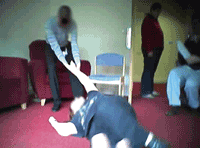
Castlebeck is to overhaul its management in the wake of the abuse scandal at Winterbourne View, chief executive Lee Reed has pledged in an exclusive interview with Community Care.
He said the company planned to improve oversight of its services by appointing 10 more senior managers after its quality assurance arrangements were slammed last week in a Care Quality Commission report on its services.
Castlebeck hit the headlines in May when BBC Panorama exposed alleged abuse at Winterbourne View, a hospital for people with learning disabilities and complex needs in Bristol. The facility has since been closed and 11 people arrested.
Reed, who became chief executive in January 2011, was “as shocked as anyone else” watching the programme. Although he has been a member of Castlebeck’s board of directors since June 2009, his role was primarily in managing a subsidiary, MCA, a mental health service provider in Wales.
“Until I took up the chief executive job I hadn’t even visited the operational services of Castlebeck,” he said.
He admitted that commissioners had withdrawn five service users from Castlebeck services since the Winterbourne scandal, and that more placements may yet be terminated.
The CQC’s report into 23 Castlebeck services said poor practice was a result of inadequate governance, with no clear system for communicating downwards senior management decisions to improve quality.
Reed said failings in this area derived from the company growing too quickly in recent years.
“Operational directors were not able to provide the level of oversight which I think is appropriate. [One of them was] trying to look after 15 units from Lincolnshire to Bristol and all things in between. That’s a big ask.”
He added: “The company grew quicker than the infrastructure did to support it.”
However, Reed denied that the expansion was just to chase profits but was driven by a desire to meet the requirements of service commissioners.
In response to the criticisms, he said he was “revamping the entire company”.
The additional 10 senior managers would boost oversight, he said. The company will have five regions, as opposed to three, with regional directors overseeing a more manageable four or five services each.
The company will also appoint leads for audit and governance and senior nursing roles in each region. Reed said he hoped the changes would allow frontline problems to be communicated more effectively to corporate management because there would be three separate lines of accountability.
This would address failings exposed in the Winterbourne View case, when whistleblower Terry Bryan’s concerns about the service were not reported to senior management nor properly followed up.
However, Reed said he was not currently minded to take disciplinary action against any managers for the failings, saying they went bigger than individuals.
The CQC’s report also identified poor practice from staff and a lack of knowledge about restraint or deprivations of liberty.
Reed said training was available but staffing pressures prevented many undertaking it. “People were finding it hard to get to training sessions when they were organised because they had to cover shifts,” he said.
Since his appointment, Reed has instigated reviews into staffing issues, the lack of activities for users and the slow progression of service users from hospitals into community-based settings.
He hoped that investment in all these areas would ensure that more people were moved from hospital and residential care settings and into the community. “When I look at some of the early admissions to some units I think people genuinely came in on the understanding it would be a home for life. That was probably their understanding, ours and the commissioners, but things have changed,” he said.
Concerns about the length of time people with learning disabilities spend in hospital settings and the quality of care in these units has sparked calls from learning disability experts to end their use altogether.
A recent investigation by Community Care revealed that one in five people in learning disability hospitals have been there for five years or longer.
“There will always be a place for hospital accommodation and that has been recognised by those who criticise that model of care,” said Reed. “But the number of learning disability assessment and treatment beds will diminish over time.”
He envisaged Castlebeck becoming more involved in supplying services in the community.
Related articles
Commissioners withdraw residents from Castlebeck facilities
CQC: Half of Castlebeck services not meeting standards
Full story on Winterbourne View
What do you think?Join the debate on CareSpace
Keep up to date with the latest developments in social care. Sign up to our daily and weekly emails


 Bournemouth, Christchurch and Poole
Bournemouth, Christchurch and Poole  Hampshire County Council
Hampshire County Council  Lincolnshire County Council
Lincolnshire County Council  Norfolk County Council
Norfolk County Council  Northamptonshire Children’s Trust
Northamptonshire Children’s Trust  South Gloucestershire Council
South Gloucestershire Council  Wiltshire Council
Wiltshire Council  Wokingham Borough Council
Wokingham Borough Council  Children and young people with SEND are ‘valued and prioritised’ in Wiltshire, find inspectors
Children and young people with SEND are ‘valued and prioritised’ in Wiltshire, find inspectors  How specialist refugee teams benefit young people and social workers
How specialist refugee teams benefit young people and social workers  Podcast: returning to social work after becoming a first-time parent
Podcast: returning to social work after becoming a first-time parent  Podcast: would you work for an inadequate-rated service?
Podcast: would you work for an inadequate-rated service?  Family help: one local authority’s experience of the model
Family help: one local authority’s experience of the model  Workforce Insights – showcasing a selection of the sector’s top recruiters
Workforce Insights – showcasing a selection of the sector’s top recruiters 

 Facebook
Facebook X
X LinkedIn
LinkedIn Instagram
Instagram
Comments are closed.